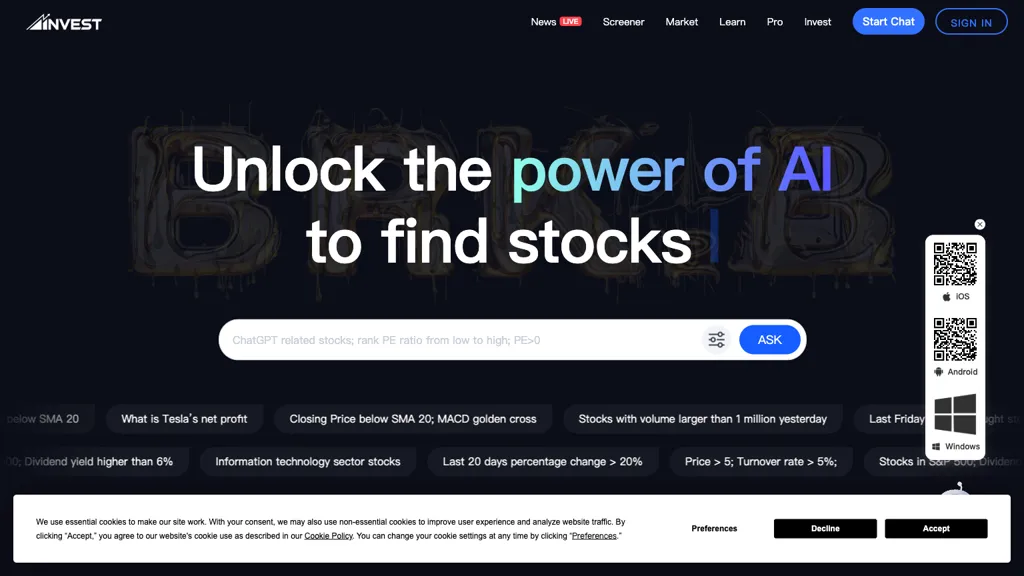20 New Ideas For Picking AI Stock Predictions Analysis Websites
20 New Ideas For Picking AI Stock Predictions Analysis Websites
Blog Article
Top 10 Suggestions For Evaluating The Integration Of Ai Analyzing/Predicting Stocks Trading Platforms
Integration and compatibility are critical aspects to consider when considering AI stock predicting/analyzing trading platforms. Platforms that integrate seamlessly with the existing workflows, tools and systems will increase productivity and efficiency. These are the top 10 guidelines for assessing the compatibility and integration of these platforms:
1. Check Brokerage Integration
Supported Brokers: Check that the platform is compatible with your favorite broker account or trading platform.
Trade execution: Check if the platform allows direct trade execution via the broker integrated.
Account synchronization: Determine if the platform can sync the balances of your account, positions and the history of transactions in real-time.
2. Examine API for Availability
API access: Check whether the platform offers an API that developers can use if they want to automate workflows or develop customized tools.
API documentation: Review for examples of how the API can be utilized.
Rate Limits: Verify the API's rate limits to ensure that they are reasonable and can accommodate your expected usage.
3. Verify the Integrity of Third-Party Tools
Popular tools: See if your platform is compatible with the most popular tools like Google Sheets or Excel.
Data export/import. Ensure the tool can export/import data quickly from/to other tools.
Plugins/extensions Verify the platform's support for extensions and plugins to provide additional functionality.
4. Test Compatibility With Operating Systems
Desktop compatibility is important. Be sure that your platform will work with the operating system you prefer (Windows MacOS Linux).
Mobile compatibility. Check if you can download the app on iOS or Android.
Web-based access: Check that the platform can be accessed via a web browser for more flexibility.
5. Assessing the Data Integrity Capabilities
Data sources: Ensure the platform is able to integrate with different data sources (e.g. market data sources, news feeds, sentiment on social media).
Real-time analytics: Make sure the platform incorporates real-time analytics.
Check the platform's ability to import data from the past.
6. Evaluation of cloud and on-premise compatibility
Cloud-based platforms : the platform should be accessible from any place that has internet access.
Solutions on-premise: If you prefer on-premise deployment, confirm if the platform supports it.
Look into the hybrid model. It combines on-premise and cloud capabilities.
7. Check for Cross Platform Syncronization
Device synchronization. The platform should connect settings and data to all devices including mobile, desktop and tablet.
Verify that changes made on the device immediately reflect on another.
Offline access - Check whether you have access to restricted functionality or data in the event that the platform isn't accessible.
8. Examine the compatibility of trading Strategies
Algorithmic trading: Make sure that the platform you select supports automated or algorithms trading strategies.
Custom indicators: Check whether the platform supports the use of customized technical indicators or scripts.
Backtesting strategies. Check whether the platform supports backtesting strategies based on the past data.
9. Assess Security and Compliance
Data encryption: Ensure that the platform uses encryption for data in transit and in rest.
Authentication Check to see if your platform supports a secure authentication method (e.g. 2-factor authentication).
Regulatory compliance: Verify that the platform is compliant with the relevant regulations (e.g. GDPR, FINRA or SEC).
10. Test Scalability and Performance
Scalability - Make sure the platform you choose will handle your growing requirements in terms of data and data.
Performance during load: Determine whether the platform is responsive under high-volatility conditions.
Utilization of resources: Determine whether the system is efficient in using system resources (CPU, memory, bandwidth).
Bonus Tips:
Users' feedback: Look for testimonials and reviews from users when evaluating the platform.
Trial period: Try the platform for free or download a demo and test how it works with your existing software and workflow.
Customer support: Check that the platform has robust assistance in the event of integration problems.
The following tips can help you evaluate the ability to integrate seamlessly and with ease AI trading platforms that predict/analyze stock prices. They can also improve your trading performance. View the most popular published here on ai for investment for site tips including best ai trading software, ai investment platform, ai trading tools, ai chart analysis, ai investing platform, ai stock market, using ai to trade stocks, best ai stock trading bot free, ai stock market, ai investing app and more.
Top 10 Tips To Evaluate The Scalability Of Ai Analysis And Stock Prediction Platforms
To make sure that AI-driven trading platforms and prediction systems can handle the increasing volume of data, user demands, and market complexity, it is essential to evaluate their scalability. Here are 10 strategies for evaluating scaling.
1. Evaluate Data Handling Capacity
Tips : Find out whether the platform has the capability to analyze and process huge databases.
Reason: Scalable platforms are required to be able to handle growing volumes of data without compromising performance.
2. Test Real-Time Processor Capabilities
Tips: Check how the platform handles real-time data streams, like live stock prices or breaking news.
The reason: Trading decisions are made in real-time and delays can lead traders to miss out on opportunities.
3. Check Cloud Infrastructure and Elasticity
Tip: Check whether the platform is able to dynamically scale resources and utilizes cloud infrastructure (e.g. AWS Cloud, Google Cloud, Azure).
Cloud-based platforms offer elasticity. They permit the system to be scaled up and down based on the need.
4. Algorithm Efficiency
Tips: Examine the computational effectiveness and the accuracy of AI models for predictions.
Reason: Complex algorithmic structures can consume a lot of resources. Optimizing them is essential to scale them.
5. Examine Parallel Processing and distributed computing
Make sure the platform is using distributed computing or parallel computing frameworks.
Why: These technologies allow more efficient data processing and analytics across multiple nodes.
Review API Integration.
Test the integration capabilities of the platform with external APIs.
Why? Seamless integration allows the platform to adapt to new trading environments and data sources.
7. Analyze User Load Handling
Try simulating high traffic levels to see the performance of your platform.
Why: Scalable platforms should deliver the same quality of service regardless of how many users there are.
8. Review the model's retraining capacity and adjustability
Tip - Assess how frequently the AI model is trained and with what efficiency.
Why is this? Markets are always shifting, and models must to be able to change quickly to remain precise.
9. Check for Fault Tolerance & Redundancy
TIP: Ensure the platform is equipped with failover mechanisms that can handle software or hardware failures.
The reason: Trading can be expensive So fault tolerance and scalability are vital.
10. Monitor Cost Efficiency
Examine the cost of your platform, including the cloud resources, storage and computation power.
Why: Scalability should not result in an unsustainable price which is why balancing performance with cost is crucial.
Bonus tip Future-proofing
Be sure that the platform is able to adapt to changes in regulations and incorporates new technologies, like quantum computing or advanced NLP.
Concentrating on these factors will allow you to assess the scalability AI stock prediction and trading platform, and ensure they are robust and efficient, capable of sustaining future expansion. Have a look at the top ai stock investing advice for website advice including best ai trading platform, trading ai tool, ai tools for trading, ai options trading, ai in stock market, ai share trading, ai trading tool, ai stock investing, ai stock price prediction, stocks ai and more.